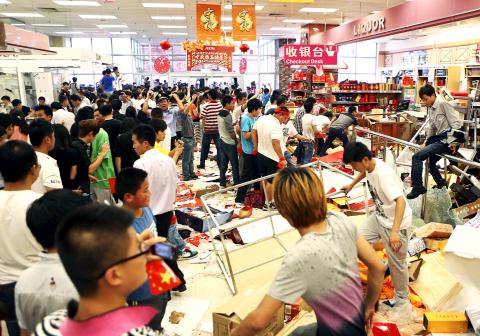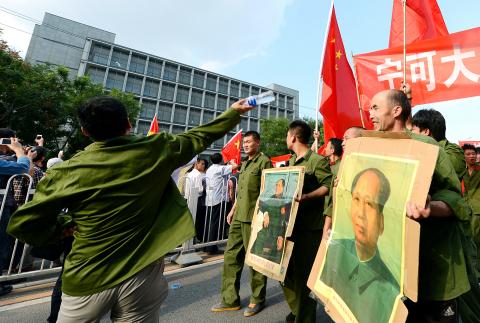Angry demonstrators attempted to storm the Japanese embassy in Beijing yesterday, state media said, as tens of thousands of people across China protested against Japan over a growing territorial dispute.
Riot police armed with batons and shields struggled to contain the swelling crowd outside the embassy, where witnesses said at least 2,000 people had gathered, some of them throwing stones and plastic bottles at the building.
A mob attempted to break into the embassy compound, but were stopped by armed police, Xinhua news agency said. It estimated the crowd at several thousand at its peak.

Photo: Reuters
Meanwhile, there were online reports that protests were staged in at least a dozen cities across China, with Japanese-built cars and Japanese restaurants being attacked by angry crowds.
Japanese media estimated 40,000 people took part in the protests nationwide.
On China’s Sina Weibo (新浪微博), a microblog similar to Twitter, images were posted of protests in Chongqing and Kunming.

Photo: AFP
Rallies were reported in several other places, including Nanjing, Xian and Taiyuan.
Much of the information about the protests posted online appeared to have been removed by the afternoon by China’s army of Internet censors — suggesting that Beijing is aiming to stop the row from spiraling further out of control.
The protests also did not feature on regular news bulletins on the state-run China Central Television.
The rumbling territorial dispute reached a new level this week, when Japan announced that it had bought islands in the East China Sea that it administers and calls the Senkaku Islands. The islands are also claimed by Taiwan, where they are called the Diaoyutai Islands (釣魚台), and China, where they are called the Diaoyu Islands.
Six Chinese ships sailed into waters around the archipelago on Friday, with Beijing saying they were there for “law enforcement,” leading Tokyo to summon the Chinese ambassador to protest what it insisted was a territorial incursion.
In the Chinese capital, where there have been large anti-Japan demonstrations for the past few days, roads were cordoned off and a helicopter hovered overhead, monitoring the embassy protest.
Nearby Japanese restaurants, which were all closed, appeared not to have been targeted by the angry crowds, but some protesters had draped Chinese flags over them.
Police monitored other demonstrations across China.
In Shanghai, police threw a security ring around the Japanese consulate, but allowed groups of protesters to approach the compound for short periods.
Scores waved Chinese flags, chanted slogans such as “Little Japanese” and held up signs insisting the islands were Chinese.
Police confiscated their signs and banners at the conclusion of the protest.
China and Japan are Asia’s two biggest economies with close trade and business ties. However, the relationship is often tense due to the territorial dispute and Chinese resentment over historical issues.
A Japanese diplomat said on Friday that Tokyo had issued a safety warning to its citizens in China after six “serious” cases of assault and harassment, all in Shanghai.

ENDEAVOR MANTA: The ship is programmed to automatically return to its designated home port and would self-destruct if seized by another party The Endeavor Manta, Taiwan’s first military-specification uncrewed surface vehicle (USV) tailor-made to operate in the Taiwan Strait in a bid to bolster the nation’s asymmetric combat capabilities made its first appearance at Kaohsiung’s Singda Harbor yesterday. Taking inspiration from Ukraine’s navy, which is using USVs to force Russia’s Black Sea fleet to take shelter within its own ports, CSBC Taiwan (台灣國際造船) established a research and development unit on USVs last year, CSBC chairman Huang Cheng-hung (黃正弘) said. With the exception of the satellite guidance system and the outboard motors — which were purchased from foreign companies that were not affiliated with Chinese-funded

PERMIT REVOKED: The influencer at a news conference said the National Immigration Agency was infringing on human rights and persecuting Chinese spouses Chinese influencer “Yaya in Taiwan” (亞亞在台灣) yesterday evening voluntarily left Taiwan, despite saying yesterday morning that she had “no intention” of leaving after her residence permit was revoked over her comments on Taiwan being “unified” with China by military force. The Ministry of the Interior yesterday had said that it could forcibly deport the influencer at midnight, but was considering taking a more flexible approach and beginning procedures this morning. The influencer, whose given name is Liu Zhenya (劉振亞), departed on a 8:45pm flight from Taipei International Airport (Songshan airport) to Fuzhou, China. Liu held a news conference at the airport at 7pm,

Authorities yesterday elaborated on the rules governing Employment Gold Cards after a US cardholder was barred from entering Taiwan for six years after working without a permit during a 2023 visit. American YouTuber LeLe Farley was barred after already being approved for an Employment Gold Card, he said in a video published on his channel on Saturday. Farley, who has more than 420,000 subscribers on his YouTube channel, was approved for his Gold Card last month, but was told at a check-in counter at the Los Angeles International Airport that he could not enter Taiwan. That was because he previously participated in two

Taiwan was ranked the fourth-safest country in the world with a score of 82.9, trailing only Andorra, the United Arab Emirates and Qatar in Numbeo’s Safety Index by Country report. Taiwan’s score improved by 0.1 points compared with last year’s mid-year report, which had Taiwan fourth with a score of 82.8. However, both scores were lower than in last year’s first review, when Taiwan scored 83.3, and are a long way from when Taiwan was named the second-safest country in the world in 2021, scoring 84.8. Taiwan ranked higher than Singapore in ninth with a score of 77.4 and Japan in 10th with